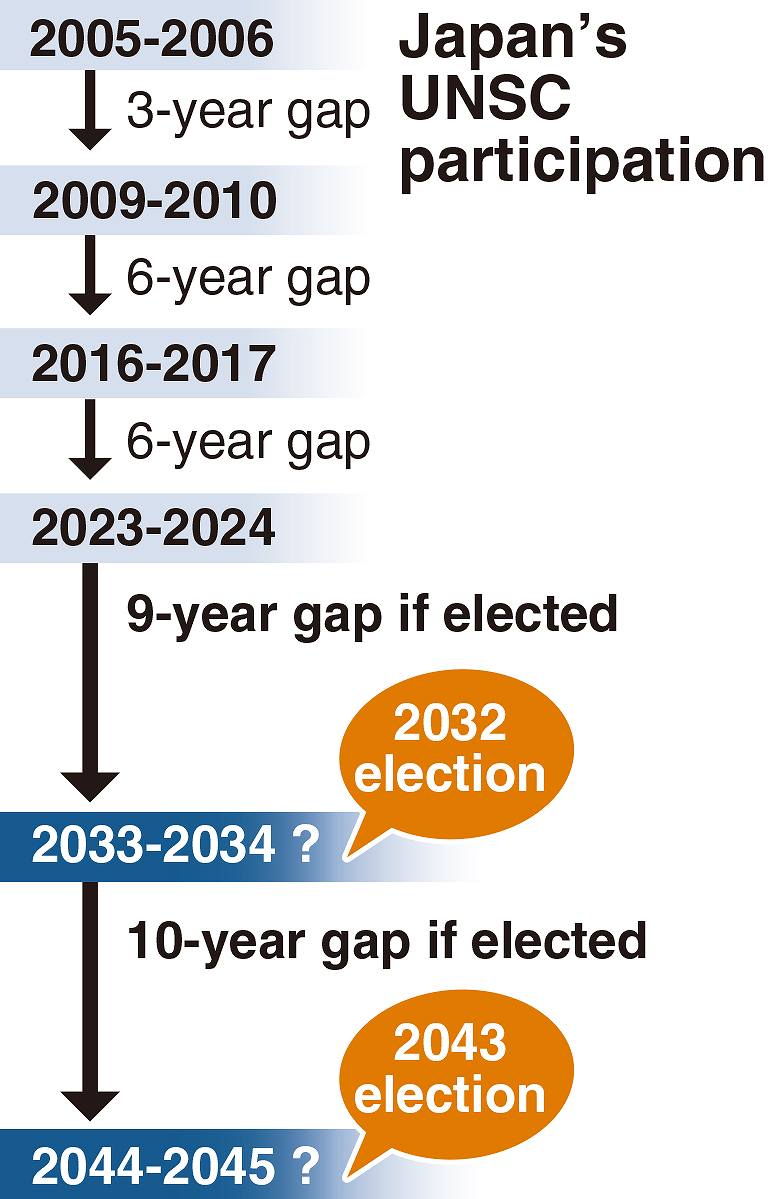Japan to Run for Non-Permanent UNSC Seat in 2043, Avoiding Competition with Emerging, Small Countries

A ministerial meeting of the United Nations Security Council is held at the U.N. headquarters in New York on Nov. 18.
2:00 JST, December 4, 2024
NEW YORK — Japan will run in the 2043 election to be a non-permanent member of the United Nations Security Council, according to U.N. diplomatic sources.
Japan usually decides to run for the Security Council a few years before an election, and has already announced its candidacy for the 2032 race. This is the first time for a decision to be made about two decades in advance.

The countries concerned have already been notified. As competition to join the Security Council intensifies, Japan has decided that it must secure other nations’ support at an early stage.
Japan has been elected as a non-permanent member of the UNSC every three to six years since 2000, and is currently serving its 12th term, the most in the world. There are 10 non-permanent members who serve terms of two years, with seats allocated geographically.
The Asia-Pacific region, composed of 54 countries including Japan, is given two seats. One of those seats is open for election every year. The UNSC has five permanent members.
In recent years, emerging countries such as India and Indonesia have shown interest in joining the Security Council. A UNSC source said Japan had to run in a year when there was no rival, due to the growing power of emerging countries.
At present, Japan is expected to vie with the Maldives, an island nation in the Indian Ocean, and other countries in 2032, the sources said. There are currently no other candidates for the 2043 slot.
Emerging countries and other countries either have already announced their candidacies or are expected to do so for every year until 2042.
Smaller countries running
The Security Council, with its complicated procedures and rules and heavy workload, used to be viewed as difficult for small countries. In recent years, however, some small nations have been able to perform the duties of U.N. council members, and opinions are changing.
According to the Security Council sources, Kyrgyzstan and Tajikistan have decided to run for their first UNSC non-permanent seats by 2042. Singapore and Indonesia are also expected to run.
Countries are seeking to become non-permanent council members because it will bring such benefits as strengthening their international influence. Russia, a UNSC permanent member, is using the high-profile Security Council as a forum to voice its unilateral claims in its aggression against Ukraine.
Japan’s influence weakens
A U.N. diplomatic source suspected Japan might lose unless it waits until 2043 to run for a seat. In the past, Japan has gained backing for its entry to the Security Council in return for economic assistance and other support, but that is currently not proving effective.
An increasing number of countries are seeking to join the Security Council for their own benefit instead of showing consideration to Japan, support from which is decreasing, a U.N. diplomatic source said.
In the past, Japan was said to have won even against India by a margin of three to four times the votes. However, if Japan were to compete now with India, a powerhouse among the emerging and developing nations of the Global South, it would be a close race, according to a Security Council source.
Japan’s weak economic growth is also a cause for concern.
As emerging countries are increasing their influence, the U.N. has been discussing reform of the Security Council, including the expansion of non-permanent members, in light of the regional balance of the world. But reform cannot be realized if a permanent member opposes it.
Some permanent members of the council such as China are standing in the way of Japan’s bid for a permanent seat, and the environment is becoming increasingly difficult for Japan, which seeks to strengthen its voice at the United Nations.
Top Articles in Politics
-

Japan PM Takaichi’s Cabinet Resigns en Masse
-

Sanae Takaichi Elected Prime Minister of Japan; Keeps All Cabinet Appointees from Previous Term
-

Japan’s Govt to Submit Road Map for Growth Strategy in March, PM Takaichi to Announce in Upcoming Policy Speech
-

LDP Wins Historic Landslide Victory
-

LDP Wins Landslide Victory, Secures Single-party Majority; Ruling Coalition with JIP Poised to Secure Over 300 seats (UPDATE 1)
JN ACCESS RANKING
-

Producer Behind Pop Group XG Arrested for Cocaine Possession
-

Japan PM Takaichi’s Cabinet Resigns en Masse
-

Japan Institute to Use Domestic Commercial Optical Lattice Clock to Set Japan Standard Time
-

Man Infected with Measles Reportedly Dined at Restaurant in Tokyo Station
-

Israeli Ambassador to Japan Speaks about Japan’s Role in the Reconstruction of Gaza






















